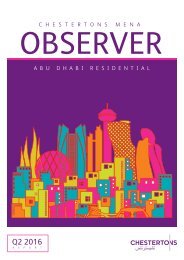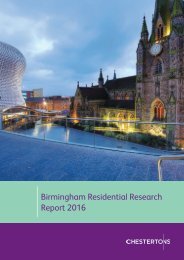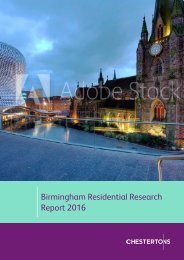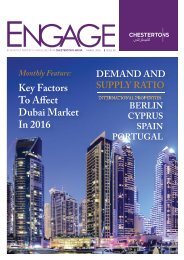Manchester Report
You also want an ePaper? Increase the reach of your titles
YUMPU automatically turns print PDFs into web optimized ePapers that Google loves.
Just 20 minutes from the city centre, <strong>Manchester</strong><br />
Airport is the third largest in the country and<br />
handles more than 22 million passengers each<br />
year. Passenger capacity is expected to reach<br />
50 million per year by 2030 and heavy investment<br />
is planned to safeguard its future growth.<br />
<strong>Manchester</strong> City Council has recently approved<br />
plans to expand the Airport City Enterprise Zone<br />
and start work on a new 2.8 million square foot<br />
Life Sciences Enterprise Zone. The zones will act<br />
as a catalyst for new businesses.<br />
Economy<br />
Greater <strong>Manchester</strong> represents the largest<br />
functional economic area outside London,<br />
with a gross value added (GVA) of over £57 billion,<br />
equivalent to 3.5% of total UK GVA. The economy<br />
has been growing at an average rate of just<br />
under 3% per annum for the past decade.<br />
The Regional Centre (defined as <strong>Manchester</strong><br />
city centre and adjacent parts of Salford and<br />
Trafford) is the economic engine of the cityregion,<br />
employing around 160,000 people. It<br />
is a nationally significant centre for financial<br />
and professional services, knowledge-based<br />
creative and new media industries, cultural<br />
events, conferencing and retail. Rising numbers<br />
of national and international organisations<br />
are locating within the city centre, alongside<br />
increasing levels of new business start-ups.<br />
The Government is in the process of negotiating<br />
with the ten core cities (including <strong>Manchester</strong>) a<br />
series of tailored ‘city deals’ that will assist future<br />
growth. <strong>Manchester</strong> will become the fastest<br />
growing city outside of the south of England<br />
over the next three years, according to a report<br />
last year by Ernst Young. <strong>Manchester</strong>’s gross<br />
value added (GVA) is forecast to grow by 73%<br />
(averaging 3.7% pa) between 2014 and 2034,<br />
outpacing the projected wider regional growth<br />
over the period.<br />
Demographics<br />
Greater <strong>Manchester</strong> is the second most populous<br />
urban area in the UK and encompasses 2.7 million<br />
inhabitants in ten metropolitan boroughs: Bolton,<br />
Bury, Oldham, Rochdale, Stockport, Tameside,<br />
Trafford, Wigan, and the cities of <strong>Manchester</strong> and<br />
Salford. The City of <strong>Manchester</strong> accounts for just<br />
under a fifth (520,000) of the population. The<br />
population of the city centre has trebled in the<br />
<strong>Manchester</strong> is also investing heavily in digital<br />
connectivity and is the only city in the UK to<br />
offer next generation broadband with ‘fibre to<br />
the premises’, allowing speeds of up to 100mbps<br />
in a true open-access network. BT has recently<br />
completed a £575 million investment programme,<br />
which reportedly places <strong>Manchester</strong> ten years<br />
ahead of other UK cities in terms of access to<br />
digital communications.<br />
The Regional Centre will continue to be the focus<br />
for economic growth in Greater <strong>Manchester</strong>.<br />
Over 150,000 new jobs are forecast to be created<br />
in the Greater <strong>Manchester</strong> area over the next 20<br />
years, with 41% of these expected in <strong>Manchester</strong><br />
alone, a large proportion of which will be located<br />
in the Regional Centre. 70% of employment<br />
growth is forecast to occur in the highly productive<br />
commercial and professional services sectors.<br />
This will have positive implications for the<br />
housing market as these jobs will command<br />
higher salaries and thus improve household<br />
affordability prospects.<br />
Greater <strong>Manchester</strong> has a strong track record<br />
with regard to attracting inward investment,<br />
with 400 projects secured in the five-year period<br />
from 2010 to 2015, creating and safeguarding<br />
over 22,500 jobs. Recent investment includes<br />
Ferranti Computer Systems Ltd opening its first<br />
UK office for over 20 years at The Landing, a<br />
digital enterprise hub located within MediaCityUK,<br />
while international law firm Squire Patton Boggs<br />
has announced plans to set-up a 27,500sq ft<br />
office in the city centre and AFEX, a leading global<br />
payment firm, has announced it will be opening<br />
a new office located on Deansgate. Since 2011,<br />
the BBC has relocated around 2,700 staff into<br />
new premises at Media City.<br />
last decade to reach just under 25,000, with this<br />
figure increasing to 50,000 when the fringe areas<br />
are taken into account.<br />
<strong>Manchester</strong> has a relatively youthful population<br />
with just over half of the residents aged 30<br />
or younger and an average age of 33. The<br />
corresponding English averages are 38% and 39%.<br />
3















